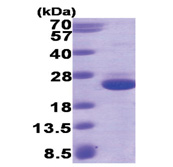HRAS (1-186, His-tag) Human Protein
Other products for "HRAS"
Specifications
| Product Data | |
| Species | Human |
| Expression Host | E. coli |
| Expression cDNA Clone or AA Sequence |
MTEYKLVVVG AGGVGKSALT IQLIQNHFVD EYDPTIEDSY RKQVVIDGET CLLDILDTAG QEEYSAMRDQ YMRTGEGFLC VFAINNTKSF EDIHQYREQI KRVKDSDDVP MVLVGNKCDL AARTVESRQA QDLARSYGIP YIETSAKTRQ GVEDAFYTLV REIRQHKLRK LNPPDESGPG CMSCKCLEHH HHHH
|
| Tag | His-tag |
| Concentration | lot specific |
| Purity | >90% by SDS - PAGE |
| Presentation | Purified |
| Buffer | Presentation State: Purified State: Liquid purified protein Buffer System: Tris-HCl buffer (pH 8.0) containing 20% glycerol, 0.1 M NaCl |
| Preparation | Liquid purified protein |
| Protein Description | Recombinant human HRAS protein, fused to His-tag, was expressed in E.coli and purified by using conventional chromatography techniques. |
| Storage | Store undiluted at 2-8°C for up to two weeks or (in aliquots) at -20°C or -70°C for longer. Avoid repeated freezing and thawing. |
| Stability | Shelf life: one year from despatch. |
| Reference Data | |
| RefSeq | NP_001123914 |
| Locus ID | 3265 |
| UniProt ID | P01112, X5D945 |
| Cytogenetics | 11p15.5 |
| Synonyms | C-BAS/HAS; C-H-RAS; C-HA-RAS1; CTLO; H-RASIDX; HAMSV; HRAS1; p21ras; RASH1 |
| Summary | This gene belongs to the Ras oncogene family, whose members are related to the transforming genes of mammalian sarcoma retroviruses. The products encoded by these genes function in signal transduction pathways. These proteins can bind GTP and GDP, and they have intrinsic GTPase activity. This protein undergoes a continuous cycle of de- and re-palmitoylation, which regulates its rapid exchange between the plasma membrane and the Golgi apparatus. Mutations in this gene cause Costello syndrome, a disease characterized by increased growth at the prenatal stage, growth deficiency at the postnatal stage, predisposition to tumor formation, cognitive disability, skin and musculoskeletal abnormalities, distinctive facial appearance and cardiovascular abnormalities. Defects in this gene are implicated in a variety of cancers, including bladder cancer, follicular thyroid cancer, and oral squamous cell carcinoma. Multiple transcript variants, which encode different isoforms, have been identified for this gene. [provided by RefSeq, Jul 2008] |
| Protein Families | Druggable Genome |
| Protein Pathways | Acute myeloid leukemia, Axon guidance, B cell receptor signaling pathway, Bladder cancer, Chemokine signaling pathway, Chronic myeloid leukemia, Endocytosis, Endometrial cancer, ErbB signaling pathway, Fc epsilon RI signaling pathway, Focal adhesion, Gap junction, Glioma, GnRH signaling pathway, Insulin signaling pathway, Long-term depression, Long-term potentiation, MAPK signaling pathway, Melanogenesis, Melanoma, Natural killer cell mediated cytotoxicity, Neurotrophin signaling pathway, Non-small cell lung cancer, Pathways in cancer, Prostate cancer, Regulation of actin cytoskeleton, Renal cell carcinoma, T cell receptor signaling pathway, Thyroid cancer, Tight junction, VEGF signaling pathway |
Documents
| FAQs |
| SDS |
Resources
Recombinant Protein Resources |
{0} Product Review(s)
0 Product Review(s)
Submit review
Be the first one to submit a review
Product Citations
*Delivery time may vary from web posted schedule. Occasional delays may occur due to unforeseen
complexities in the preparation of your product. International customers may expect an additional 1-2 weeks
in shipping.






























































































































































































































































 Germany
Germany
 Japan
Japan
 United Kingdom
United Kingdom
 China
China
